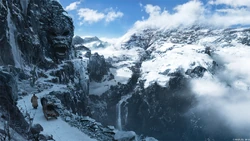Jabari Land, or J'Abariland, is a snowy mountainous and isolated region of Wakanda that serves as home to the Jabari Tribe.
History[]
Settled by the Jabari Tribe[]
- "Four tribes agreed to live under the King's rule, but the Jabari Tribe isolated themselves in the mountains."
- ―N'Jobu[src]
Having refused to pledge fealty to Bashenga and the Golden Tribe, the Jabari Tribe isolated themselves in a mountainous and snowy region of Wakanda, which therefore became known as the Jabari Land. The Jabari remained far from the rest of Wakanda and the vibranium technology they relied on, preferring more traditional resources found in the Jabari Land, like hardened wood for construction and weapons. For centuries, no Wakandan King ever journeyed to the Jabari Land.[1]
Helping T'Challa[]
Conversely, as T'Challa prepared to be crowned King of Wakanda, a delegation of Jabari led by the tribe leader M'Baku left the Jabari Land for the Warrior Falls in order to challenge T'Challa, claiming that they had spent years observing the rest of Wakanda from the mountains and disagreed with the path they had chosen. As M'Baku was defeated, they returned to Jabari Land.

T'Challa is rescued and taken to Jabari Land
T'Challa, who was defeated by Erik Killmonger during their duel and thrown down into the river, drifted all the way to Jabari Land, where he was rescued by a Jabari fisherman who took the unconscious T'Challa to M'Baku. The Jabari kept T'Challa with them in Jabari Land, covered in snow to maintain his comatose state and prevent him from dying. In the same time, Ramonda, Shuri, Nakia and Everett Ross, who had exiled themselves after Killmonger's victory, arrived in Jabari Land and were captured by a group of Jabari warriors.
The newcomers explained their plan to M'Baku: giving him the last Heart-Shaped Herb so he could fight Killmonger and claim the throne of Wakanda. Instead, M'Baku revealed that T'Challa was still alive and authorized them to use the herb to save T'Challa. Once T'Challa recovered, he and M'Baku discussed about Killmonger's rule. Although M'Baku refused to lend Jabari troops to T'Challa so he could reclaim the throne, he agreed to provide shelter to Ramonda in Jabari Land until the conflict was ended.
However, despite M'Baku's initial refusal, he knew that Killmonger would come after the Jabari should T'Challa fail. Therefore, M'Baku led his armies out of Jabari Land and provided valuable reinforcements during the Battle of Mount Bashenga. As most of the Jabari returned to Jabari Land, M'Baku was granted a seat in the Tribal Council for his support and shared his time between Jabari Land and the Golden City.[1]
Assata's Troubles[]
Assata went to the Amanzi Kwakhona Umlambo on the border of Jabari Land and cried, upset about the fact that it seemed impossible for her to join the Dora Milaje. She was found by M'Baku, to whom she explained what was upsetting her. M'Baku encouraged her, telling her that impossible simply meant another way needed to be found in order to achieve one's goal. M'Baku told Assata that people's dreams were what made Wakanda special, and Assata realized that she could join the Dora Milaje. She felt inspired by M'Baku's words and the next day decided to join the Dora Milaje.[2]
Providing Refuge[]
To be added[3]
Behind the Scenes[]
- Hannah Beachler and Ryan Coogler originally meant for the Jabari Land to be set in the tropical rainforest, until Coogler came up with the idea of a mountain tribe "What if they were in the mountains in the snow?’ ‘Okay, we’re going to do this. We’re going to do snow."[4]
